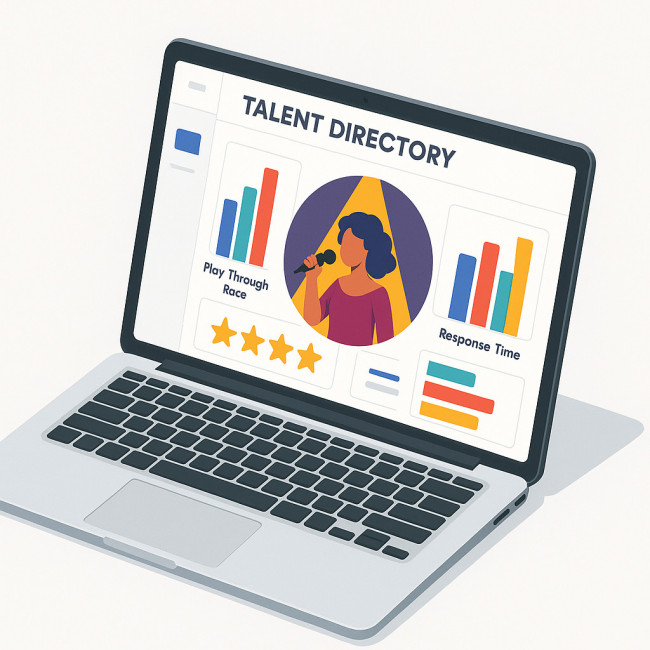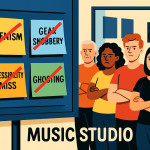Data-driven scouting: metrics predicting singer booking potential in directories
Wondering which numbers truly persuade talent buyers to click “Book now”? This guide breaks down the data signals hidden inside every singer profile and shows you how to turn them into booking magnets. From demo-completion rates to response-time scores, you will learn which metrics matter, why they influence recruiters and how to optimise each one for maximum impact.
Why numbers beat gut feelings in modern talent scouting
Entertainment recruiters handle hundreds of profiles per project. Decision-making is faster when they can rely on clear, comparable metrics instead of subjective impressions. Well-optimised statistics:
- Reduce screening time by up to 40 % for busy agencies.
- Give singers objective talking points during rate negotiations.
- Feed directory algorithms that surface the most “bookable” voices first.
Mastering those numbers means your listing rises above equally skilled competitors before a note is even heard.
The five core metrics that predict booking potential
| Metric | What it measures | Target benchmark | Impact on booking likelihood |
|---|---|---|---|
| Profile view-to-inquiry ratio | Percentage of visitors who send a message or quote request. | > 15 % | Signals immediate interest; directories rank you higher in search. |
| Demo play-through rate | Share of listeners who reach the last 10 % of your main audio reel. | > 60 % | Shows vocal consistency and keeps recruiters engaged longer. |
| Average review score | Mean of 1–5-star ratings from verified clients. | 4.7 + | Social proof that lowers perceived hiring risk. |
| First-response time | Minutes between inquiry and first reply during business hours. | < 90 min | Correlates with reliability and increases shortlist retention. |
| Calendar update frequency | Number of availability edits per month. | 4+ | Keeps algorithms confident that your dates are accurate. |
1. Boost the view-to-inquiry ratio
High-converting thumbnails and headlines stop the scroll. Refresh your hero image following the tips in this visual optimisation guide and align it with the dominant colour palette of your genre. Pair the shot with a headline that includes vocal range and speciality (e.g., “Soulful Alto – 500+ weddings”).
2. Increase demo play-through
- Place your strongest 15 seconds first. Recruiters decide within 7 seconds whether to continue listening.
- Edit out long instrumental intros; voice should enter before the 5-second mark.
- Publish separate reels for different markets (corporate, festival, studio) and tag them clearly.
Need more ideas? See how badges and visual cues influence listen-through in this credibility hack article.
3. Maintain stellar reviews
Automate post-gig review requests within 24 hours while the experience is fresh. Offer a brief template to make writing easier and remind clients they can highlight punctuality, stage presence and set-list flexibility.
4. Slash your response time
Enable push notifications on the directory app, craft a 120-character “instant reply” and integrate availability snippets. When agencies use one-click shortlists, singers who respond first often secure the contract before others even read the message.
5. Keep your calendar alive
Empty or outdated calendars frustrate planners. Sync your Google or iCal feed and block tentative dates as “on hold” to stay transparent. Frequent updates also boost placement in geo-filtered searches like those described in this geo-targeting playbook.
Advanced analytics every performer should track
Once you nail the core five, dive into secondary signals:
- Repeat booking rate – percentage of clients who hire you again within 12 months.
- Quote acceptance rate – share of proposals that convert to signed contracts.
- Average negotiation delta – difference between initial quote and final fee.
- Profile save-to-share ratio – indicator of viral potential among event planners.
Track these KPIs in your directory dashboard or connect the API to a simple spreadsheet for longitudinal analysis.
Visualising the numbers
Putting data to work: a step-by-step optimisation sprint
- Audit – Export existing metrics from your directory dashboard.
- Prioritise – Pick the two lowest-performing KPIs.
- Implement fixes – Use the tactic lists above; set weekly micro-goals.
- Measure again – Compare deltas after 30 days.
- Iterate – Move to the next two KPIs and repeat.
Budget filters: let numbers negotiate for you

Event planners frequently refine searches by fee range. Align your public rate tiers with insights from this budget-filter strategy guide. A transparent matrix (solo, duo, full band) increases quote acceptance and minimises back-and-forth. Displaying clear pricing also positions you as a professional who respects organisers' time, helping them justify your fee to stakeholders while reinforcing trust in your overall brand presence across the directory's ecosystem.
Interactive Quiz: Test your data-savvy profile skills
FAQ
- Do I need expensive software to track these metrics?
- No. Most directories, including the Artfolio singer directory, provide built-in dashboards you can export to a spreadsheet.
- How often should I update my demo reel?
- Refresh it every six months or after any major vocal change, new genre addition or production upgrade.
- Can strong metrics offset a lack of high-profile credits?
- Yes. Recruiters frequently shortlist emerging singers with outstanding data signals because the numbers reduce perceived risk.
Final note: let data lead your artistry
Your voice remains the heart of your craft, but numbers get you in the room where singing can seal the deal. Audit, optimise and monitor these metrics monthly. Soon, your profile will climb search results, and booking confirmations will outnumber the endless “just checking availability” messages.
Ready to turn insights into income? Log in now, implement one optimisation per metric and watch your next 30 days of bookings grow.











